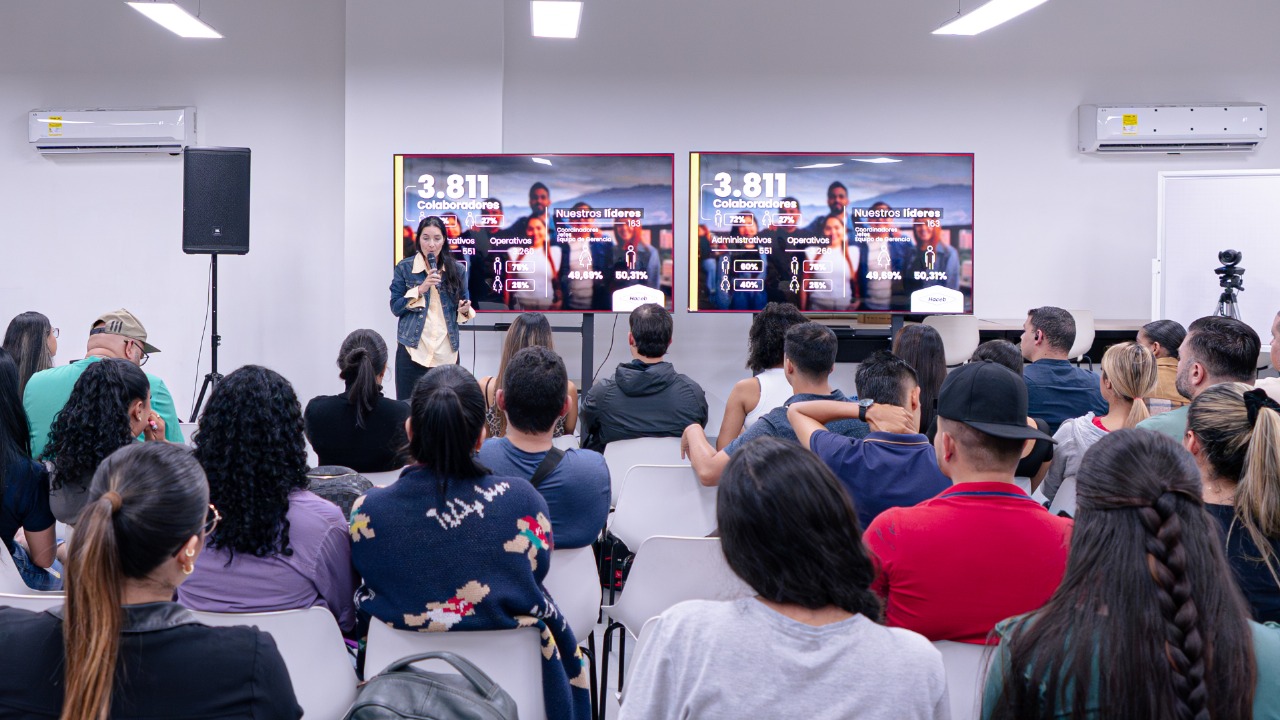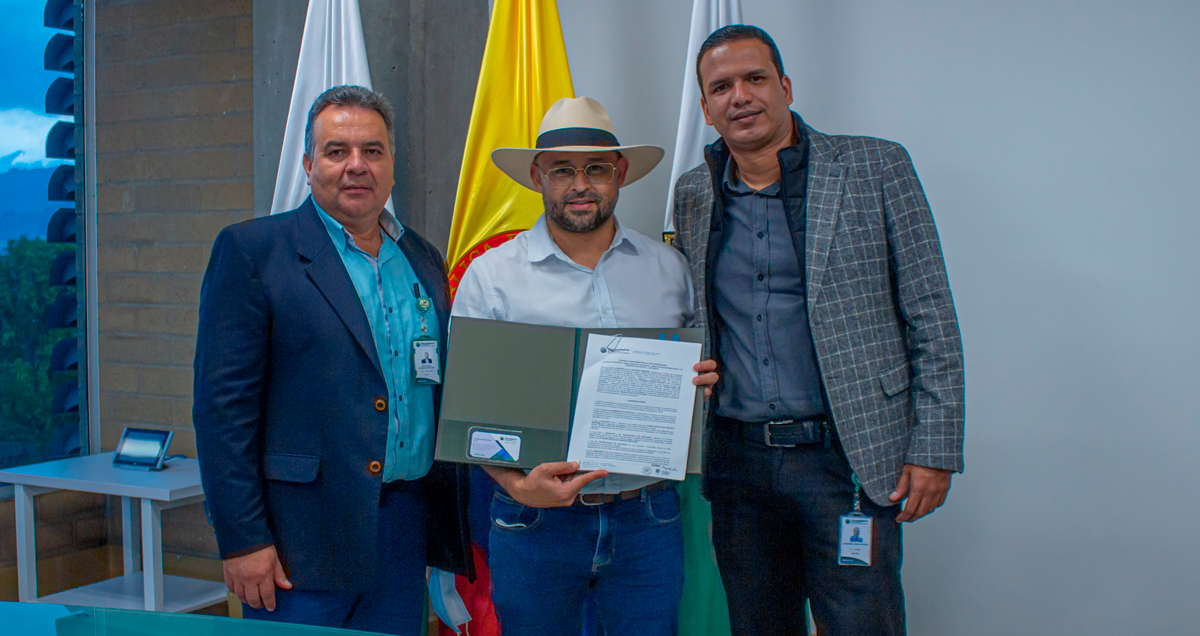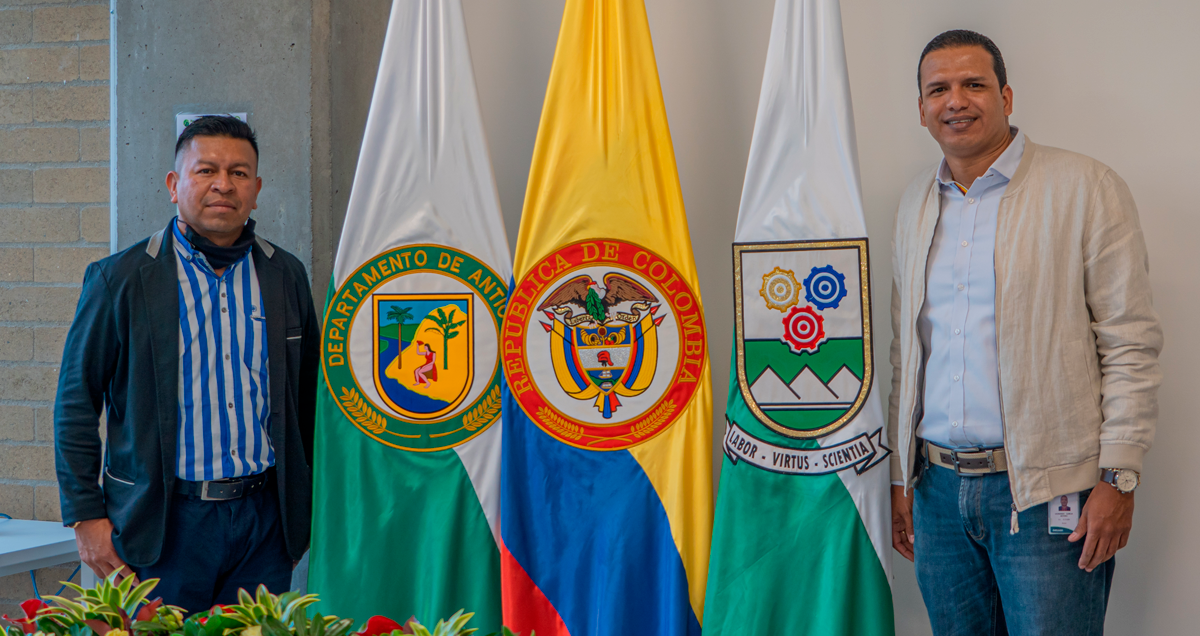El Tecnológico de Antioquia suscribió convenios con el Resguardo Indígena de Cristianía y el Municipio de Vegachí para procesos de regionalización de la educación superior.
“El Plan de Desarrollo del Tecnológico de Antioquia 2022-2026: Ser, hacer y trascender, lo hemos revisado y redimensionado entre todos, dándole una mirada futurista a la Institución Universitaria y, por ende, una proyección a las subregiones”. Así lo indica el director de Regionalización del TdeA, Danilo Álvarez Rodríguez, quien reconoce que este centro de estudios superiores, bajo la rectoría de Leonardo García Botero, pretende darle un nuevo impulso a la presencia de la educación en las regiones del departamento.
Precisamente, el rector, García Botero, informó acerca de la suscripción de dos convenios de cooperación con el TdeA. El primero, con el Resguardo Indígena Cristianía, mediante el cual se facilitará el uso de las instalaciones de la Institución Educativa Embera Karmata Rúa, con el fin de realizar procesos de formación, cultura y desarrollo social para esta comunidad. Por su parte, con el Municipio de Vegachí se dispondrá de las instalaciones del Parque Educativo Maruja Martínez, también, con el objetivo de ofrecer opciones educativas para la población del Nordeste.
El TdeA ha tenido una vocación regional y se ha destacado como una de las instituciones en Antioquia que más ha llegado a los municipios por fuera del área metropolitana. Lo ha hecho en 87 localidades con programas pertinentes y de calidad. Actualmente, hace presencia en Urrao con tres grupos de Contaduría Pública, en Ciudad Bolívar con dos de Trabajo Social y, en Marinilla con tres de Psicología; además, tiene programas en Copacabana e Itagüí, este último donde se construye el campus universitario Aburrá Sur.
“Hacer regionalización no es fácil, dado que es necesario cumplir con las condiciones de calidad exigidas por el Ministerio de Educación Nacional y contar con un compromiso claro de las administraciones locales, además, hacer una buena lectura del contexto. Así lo hemos hecho y el TdeA quiere darle un segundo aliento al programa de regionalización. Tenemos una gran oportunidad, el Decreto 1330 de 2019, con el que la Institución Universitaria puede solicitar registros únicos y, con el tema de autoevaluación, poder valorar y, si es pertinente, llevar programas a los diferentes municipios del departamento”, apunta Álvarez Rodríguez.
De acuerdo con el directivo: “siempre hemos buscado cerrar esa brecha que hay entre el nivel central, el Municipio de Medellín, el Área Metropolitana y las diferentes subregiones del departamento. Porque si bien es cierto que hay 34 instituciones de educación superior que atienden la demanda en el Área Metropolitana; en las otras subregiones, las oportunidades que dan las universidades, es muy poca”.
No obstante, la Institución Universitaria tiene otras alternativas: llevar este año programas de Educación para el Trabajo y el Desarrollo Humano. En ese sentido, Álvarez Rodríguez explica que: “estamos en la elaboración de unos 30 programas, que se van a presentar a la Gobernación de Antioquia y al Municipio de Medellín para sus respectivos permisos y resoluciones y aprovechar el tema de articulación de la educación básica con la media técnica. De igual forma, pensamos en unos diplomados y cursos pertinentes, en temas ambientales y de la cuarta revolución, que se puedan encadenar con los ciclos posteriores de programas de educación superior.
![]()
TdeA Resizes Presence in the Subregions of Antioquia
Tecnológico de Antioquia signed agreements with the Indigenous Reservation of Cristianía and the Municipality of Vegachí for processes higher education regionalization (in the regions).
"The Development Plan of the Tecnológico de Antioquia 2022-2026: Being, doing and transcending, has reviewed and resized it together, giving a futuristic look at the University Institution and, therefore, a projection to the subregions." This is indicated by the director of Regionalization of the TdeA, Danilo Álvarez Rodríguez, who recognizes that this center of higher studies, under the leadership of Leonardo García Botero, intends to give a new impetus to the presence of education in the regions of the department.
Precisely, president, García Botero, reported on the signing of two cooperation agreements with the TdeA. The first, with the Cristianía Indigenous Reservation, through which the use of the facilities of the Embera Karmata Rúa Educational Institution will be facilitated, in order to carry out processes of training, culture and social development for this community. For its part, with the Municipality of Vegachí will have the facilities of the Maruja Martínez Educational Park, also, with the aim of offering educational options for the population of the Northeast.
TdeA has had a regional vocation and has stood out as one of the institutions in Antioquia that has most reached the municipalities outside the metropolitan area. It has done so in 87 locations with relevant and quality programs. Currently, it is present at Urrao with three groups of Public Accounting, Ciudad Bolívar with two of Social Work and, Marinilla with three of Psychology; In addition, it has programs at Copacabana and Itagüí, the latter where the Aburrá Sur university campus is being built.
"Regionalization is not easy, since it is necessary to comply with the quality conditions demanded by the Ministry of National Education and have a clear commitment from local administrations, in addition, to make a good reading of the context. We have done so and TdeA wants to give a second breath to the regionalization program. We have a great opportunity, Decree 1330 of 2019, with which the University Institution can request unique records and, with the theme of self-evaluation, be able to assess and, if relevant, take programs to the different municipalities of the department, "says Álvarez Rodríguez.
According to the director: "We have always sought to close that gap between the central level, the Municipality of Medellín, the Metropolitan Area and the different subregions of the department. Because while it is true that there are 34 higher education institutions that meet the demand in the Metropolitan Area; in the other subregions, the opportunities given by universities are very few."
However, the University Institution has other alternatives: to carry out this year programs of Education for Work and Human Development. In that sense, Álvarez Rodríguez explains that: "we are in the creation of about 30 programs, which will be presented to the Government of Antioquia and the Municipality of Medellín for their respective permits and resolutions and take advantage of the issue of articulation of basic education with the technical average. In the same way, we think of some diplomas and relevant courses, in environmental issues and of the fourth revolution, that can be linked with the subsequent cycles of higher education programs.






